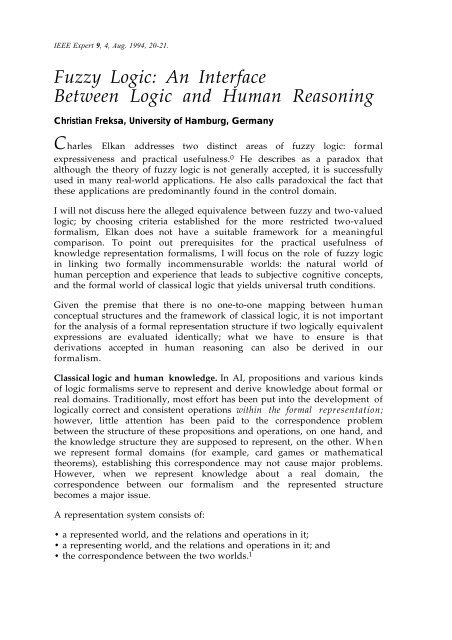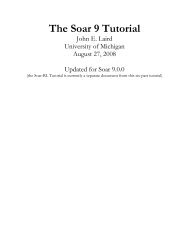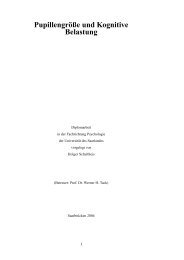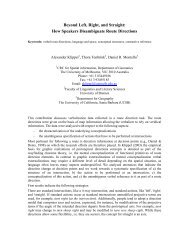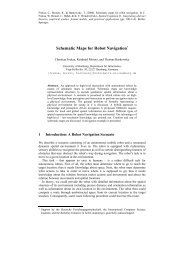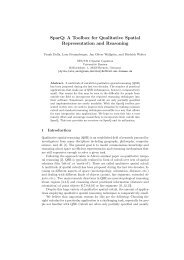Fuzzy Logic: An Interface Between Logic and Human Reasoning
Fuzzy Logic: An Interface Between Logic and Human Reasoning
Fuzzy Logic: An Interface Between Logic and Human Reasoning
Create successful ePaper yourself
Turn your PDF publications into a flip-book with our unique Google optimized e-Paper software.
IEEE Expert 9, 4, Aug. 1994, 20-21.<br />
<strong>Fuzzy</strong> <strong>Logic</strong>: <strong>An</strong> <strong>Interface</strong><br />
<strong>Between</strong> <strong>Logic</strong> <strong>and</strong> <strong>Human</strong> <strong>Reasoning</strong><br />
Christian Freksa, University of Hamburg, Germany<br />
Charles Elkan addresses two distinct areas of fuzzy logic: formal<br />
expressiveness <strong>and</strong> practical usefulness. 0 He describes as a paradox that<br />
although the theory of fuzzy logic is not generally accepted, it is successfully<br />
used in many real-world applications. He also calls paradoxical the fact that<br />
these applications are predominantly found in the control domain.<br />
I will not discuss here the alleged equivalence between fuzzy <strong>and</strong> two-valued<br />
logic; by choosing criteria established for the more restricted two-valued<br />
formalism, Elkan does not have a suitable framework for a meaningful<br />
comparison. To point out prerequisites for the practical usefulness of<br />
knowledge representation formalisms, I will focus on the role of fuzzy logic<br />
in linking two formally incommensurable worlds: the natural world of<br />
human perception <strong>and</strong> experience that leads to subjective cognitive concepts,<br />
<strong>and</strong> the formal world of classical logic that yields universal truth conditions.<br />
Given the premise that there is no one-to-one mapping between human<br />
conceptual structures <strong>and</strong> the framework of classical logic, it is not important<br />
for the analysis of a formal representation structure if two logically equivalent<br />
expressions are evaluated identically; what we have to ensure is that<br />
derivations accepted in human reasoning can also be derived in our<br />
formalism.<br />
Classical logic <strong>and</strong> human knowledge. In AI, propositions <strong>and</strong> various kinds<br />
of logic formalisms serve to represent <strong>and</strong> derive knowledge about formal or<br />
real domains. Traditionally, most effort has been put into the development of<br />
logically correct <strong>and</strong> consistent operations within the formal representation;<br />
however, little attention has been paid to the correspondence problem<br />
between the structure of these propositions <strong>and</strong> operations, on one h<strong>and</strong>, <strong>and</strong><br />
the knowledge structure they are supposed to represent, on the other. When<br />
we represent formal domains (for example, card games or mathematical<br />
theorems), establishing this correspondence may not cause major problems.<br />
However, when we represent knowledge about a real domain, the<br />
correspondence between our formalism <strong>and</strong> the represented structure<br />
becomes a major issue.<br />
A representation system consists of:<br />
• a represented world, <strong>and</strong> the relations <strong>and</strong> operations in it;<br />
• a representing world, <strong>and</strong> the relations <strong>and</strong> operations in it; <strong>and</strong><br />
• the correspondence between the two worlds. 1
When representing knowledge about the real world, it is inherently<br />
impossible to prove something about the represented real-world knowledge;<br />
this part of the representation system is outside the formalism. We only can<br />
prove something within the representing formalism. Thus, the represented<br />
real world <strong>and</strong> its representation are formally incommensurable.<br />
In expert systems, the knowledge engineer establishes the correspondence<br />
between the real <strong>and</strong> formal worlds, but he cannot prove its correctness; he<br />
depends on his perception <strong>and</strong> intuition to determine the equivalence<br />
between the two. Usually, a knowledge engineer relies upon assumptions to<br />
determine the validity of operations on a representation. These assumptions<br />
stem from his knowledge about formal logic, rather than from knowledge<br />
about specific properties of human reasoning. Nevertheless – as Elkan's<br />
article shows – this approach appears to be widely accepted for the treatment<br />
of human knowledge.<br />
One of Lotfi Zadeh's main motivations for introducing the notions of fuzzy<br />
sets <strong>and</strong> fuzzy logic was his observation that real-world knowledge generally<br />
has a different structure <strong>and</strong> requires different formalization than existing<br />
formal systems. Contrary to established practice, a one-to-one correspondence<br />
between natural-language propositions <strong>and</strong> predicate calculus propositions<br />
can be shown to be inadequate. In particular, the instantaneous switch from<br />
truth to falsity can easily distinguish propositions in classical logic from those<br />
in natural language. In addition, numerous assumptions of the formally<br />
correct treatment of the propositions cannot be established in the<br />
corresponding source knowledge.<br />
The fuzzy logic interface. Zadeh recognized the power of a formal approach to<br />
knowledge processing as well as the advantages of using soft knowledge in<br />
human reasoning. He thus took a first step in incrementally relaxing<br />
constraints imposed on existing formalisms to accommodate important<br />
properties of natural inference. This step was to generalize the classical notion<br />
of a set to the notion of a fuzzy set that allowed gradual membership. The<br />
choice of numerical degrees of membership was largely made for formal<br />
reasons: it provided a transparent way of formally treating the new notion.<br />
Using the familiar language of mathematics, the theory can easily be<br />
implemented in computer systems, while at the same time offering a better<br />
approximation to the associated human concepts. Because human notions<br />
<strong>and</strong> concepts form the basis for reasoning in expert systems, the success of<br />
these systems depends upon the correspondence relation between human<br />
concepts <strong>and</strong> their formalization. Studying the formal properties of the<br />
representation is insufficient.<br />
Zadeh realized that it was much more important to have a good model of the<br />
semantics of human concepts <strong>and</strong> perform reasonable operations than to<br />
have a bad model <strong>and</strong> perform verifiably correct operations. He never<br />
insisted that his initial proposal for a fuzzy logic should be viewed as the final<br />
solution for representing human knowledge about the world; rather, he<br />
offered a model based on established notions that could easily be grasped by<br />
engineers <strong>and</strong> researchers alike as a step toward formalizing human<br />
– 2 –
easoning. Because of this, Zadeh's basic notion of a fuzzy set stimulated<br />
enormous research activity in soft knowledge processing.<br />
Zadeh's work also helped establish a radically different view of the status of<br />
expert knowledge. No longer is it viewed as a collection of absolute truths<br />
piped into an inference engine to derive all sorts of unexpected results; rather,<br />
it is now considered as a system of more or less soft constraints that are<br />
applied to specific situations to make reasonable decisions.<br />
Soft knowledge is processed differently than logic clauses – the reasoning<br />
power is typically due to processing breadth rather than depth. The ability to<br />
use shallow processing to merge knowledge from different sources produced<br />
useful decisions. (Elkan uses the terms "deep" <strong>and</strong> "shallow" in two different<br />
senses: to distinguish general knowledge from specific knowledge, <strong>and</strong> to<br />
distinguish extensive <strong>and</strong> restricted knowledge propagation. I use the terms<br />
here in the second sense, which is the usual sense.) Elkan appears to attribute<br />
the fact that fuzzy systems employ only a few rules to the domain's simplicity.<br />
However, this fact can also be attributed to the important capability of<br />
summarizing complex knowledge into a dense <strong>and</strong> transparent description.<br />
Success <strong>and</strong> limitations. The fuzzy set paradigm introduced a new concept of<br />
soft knowledge that helped characterize an important aspect of knowledge<br />
about complex environments. It also provides a language to bridge the gap<br />
between soft <strong>and</strong> shallow knowledge, on the one h<strong>and</strong>, <strong>and</strong> systematic <strong>and</strong><br />
formal methods for dealing with it, on the other. This contribution might<br />
have a much more significant impact on human thought <strong>and</strong> the role of<br />
classical logic in systems analysis than the fuzzy set notion will have on the<br />
success of expert systems. As the transition from crisp sets to fuzzy sets is a<br />
rather moderate step toward accounting for the nature of human concepts, we<br />
should not expect it to solve all our problems. In particular, fuzzy sets <strong>and</strong><br />
fuzzy logic do not answer the fact that human concepts develop <strong>and</strong> are<br />
modified in an open world, while formal concepts are fixed in closed worlds,<br />
for the most part. Therefore, it is not surprising that successful applications of<br />
fuzzy logic are so far found mainly in well-defined closed domains like<br />
control problems which, to a large extent, share the properties of synthetic,<br />
formal problems. The way gradual membership is represented in fuzzy sets<br />
quite naturally suits such application domains.<br />
The further we move from representing human knowledge about clearly<br />
delineated problems to representing concepts relating to open domains, the<br />
more we will have to overcome certain rigidities of the classical formal<br />
approaches.<br />
Classical logic has proved extremely useful for solving formal problems<br />
specified in two-valued terms. <strong>Fuzzy</strong> logic is proving particularly useful for<br />
quasi-formal problems involving gradual transitions between various system<br />
states. For adequately formalizing less rigid domains, like the open world of<br />
human fuzzy concepts, we must relax the constraints on the formalisms even<br />
more. Specifically, numerical graduation of membership used in classical<br />
fuzzy logic is hardly justified for the representation of cognitive concepts;<br />
– 3 –
instead, less constraining ordering relations like partial orderings may be<br />
appropriate.<br />
Considering the fact that it took 25 years to put fuzzy logic into wide use in<br />
the well-understood engineering domain of control, we should not be<br />
surprised if some barriers must be removed before fuzzy logic will be widely<br />
applied to more delicate areas of fuzzy reasoning.<br />
For judging the quality of a representation formalism, I have proposed taking<br />
a representation-theoretical viewpoint: The correspondence between the<br />
represented domain <strong>and</strong> the formalism is at least as important as the<br />
representation's formal properties taken by themselves. This viewpoint<br />
permits a high-level characterization of the overall representation problem. I<br />
have also argued that real-world knowledge <strong>and</strong> formal knowledge are<br />
formally incommensurable. As long as the laws of human reasoning are not<br />
well understood, a good model of human reasoning should be expected to<br />
preserve some paradoxes; experimentation with the model may deepen the<br />
underst<strong>and</strong>ing <strong>and</strong> help resolve them.<br />
Acknowledgments<br />
I acknowledge stimulating discussions on this topic at the Tasso workshop<br />
1993 in Bonn; at the panel discussion on <strong>Fuzzy</strong> <strong>Logic</strong> <strong>and</strong> AI at IJCAI '93 in<br />
Chambery, France; at the GI-Workshop "<strong>Fuzzy</strong>-Systeme '93" in<br />
Braunschweig, Germany; <strong>and</strong> valuable comments by Gerhard Dirlich.<br />
References<br />
0. C. Elkan, "The Paradoxical Success of <strong>Fuzzy</strong> <strong>Logic</strong>," IEEE Expert, to appear.<br />
1. S.E. Palmer, "Fundamental Aspects of Cognitive Representation,"<br />
Cognition <strong>and</strong> Categorization, Lawrence Erlbaum, Hillsdale, N.J., 1978. pp.<br />
259-303.<br />
Christian Freksa is a professor in the Computer Science Department <strong>and</strong> the<br />
Cognitive Science Graduate Program at the University of Hamburg, Germany.<br />
His research interests include qualitative spatial <strong>and</strong> temporal reasoning, <strong>and</strong><br />
representing incomplete, uncertain, <strong>and</strong> fuzzy knowledge about the physical<br />
world. He studied computer science <strong>and</strong> AI at the Technical University of<br />
Munich, the University of San Francisco, <strong>and</strong> the University of California,<br />
Berkeley, where he received his Ph.D. in 1981. His work has appeared in<br />
several journals <strong>and</strong> anthologies, including Approximate <strong>Reasoning</strong> in<br />
Decision <strong>An</strong>alysis, (North-Holl<strong>and</strong>, 1982), <strong>and</strong> Artificial Intelligence<br />
Methodology, Systems, Applications, (North-Holl<strong>and</strong>, 1985), <strong>and</strong> Artificial<br />
Intelligence Journal 1992. Christian Freksa can be reached at the Fachbereich<br />
Informatik, Universität Hamburg, Vogt-Kölln-Str. 30, 22527 Hamburg,<br />
Germany; fax 49-40-54715-385; Internet: freksa@informatik.uni-hamburg.de.<br />
– 4 –


